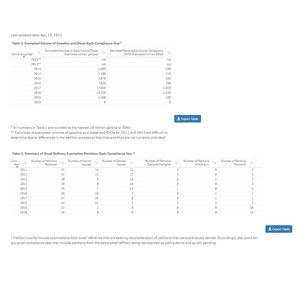Senate Inflation Reduction Act packed with bioenergy incentives
Energy Disrupter
ADVERTISEMENT
U.S. Sen. Joe Manchin, D-West Virginia, announced on July 27 that an agreement has been reached with Sen. Majority Leader Chuck Schumer, D-New York, to bring the Inflation Reduction Act of 2022—a major tax and climate package—to a vote. According to statements by Machin’s office, the act is designed to “address record inflation by paying down our national debt, lowering energy costs and lowering healthcare costs.”
The bill proposes many bioenergy incentives, particularly the extension and modification of existing tax credits and creation of new ones.
As for liquid biofuels, it includes, but not limited to: an extension of the current $1 per gallon biodiesel and renewable diesel blenders credit from the current year-end expiration date to Dec. 31, 2024; an extension of the 50-cent-per-gallon alternative fuels tax credit and the (up to) $1.01-per-gallon second-generation biofuel producer credit that expired Jan. 1; as well as the provision of a tax credit for sustainable aviation fuel, which would start at $1.25 per gallon and extend up to $1.75 per gallon, depending on lifecycle greenhouse gas emission reduction percentages.
The bill also includes extensions of and modifications to the Section 45 renewable electricity production tax credit (PTC). The current PTC provides a corporate tax credit of 1.3 cents/kilowatt-hour (kWh) for electricity generated from landfill gas, open-loop biomass, municipal solid waste resources, qualified hydroelectric and marine and hydrokinetic. Electricity from wind, closed-loop biomass and geothermal resources receive as much as 2.5 cents/kWh. If passed, projects beginning construction before Jan. 1, 2025, would qualify for the PTC, as opposed to Dec. 31, 2021. Additionally, the PTC would be restructured into a base credit and an increasing credit (20% and up to 80%, respectively) which would be granted per meeting certain facility and prevailing wage and apprenticeship requirements.
In addition, the bill would amend Section 45Q to include carbon capture facilities undergoing construction prior to January 2033. “Under the bill’s provisions, any carbon capture, direct air capture or carbon utilization project beginning construction before Jan. 1, 2033, will qualify for the federal 45Q tax credit,” stated the Carbon Capture Coalition. “… Furthermore, the legislation significantly boosts credit values to accelerate project deployment and emissions reductions in key sectors, increasing the value of 45Q for industrial facilities and power plants that capture their carbon emissions to $85 per metric ton for CO2 stored in secure geologic formations, $60 per ton for the beneficial utilization of captured carbon emissions and $60 per ton for CO2 stored in oil and gas fields. “
Among many other clean energy and carbon reduction incentives, the bill includes extensions and modifications of some Section 25D residential investment energy credits, including part of the BTU Act— the 26% residential tax credit for high-efficiency wood or pellet stoves—which would be extended to 2032.
According to Senate Democrats, the combined investments in the FY2022 Budget Reconciliation bill would put the U.S. on a path to roughly 40% emissions reduction by 2030, and would represent the single biggest climate investment in U.S. history, by far.
In statements released on Aug. 27th, President Biden indicated strong support of the bill, saying this action is what American people have been waiting for. He urged the Senate and House to move on the bill as soon as possible.
Bioenergy association leaders expressed enthusiasm for the proposed bill.
The Advanced Biofuels Association lauded the bill, saying it will provide much-needed certainty for U.S. biofuels. “The Advanced Biofuels Association is pleased that the new Senate Inflation Reduction Act will provide extensions for renewable diesel and clean fuel production tax credits, as well as create a sustainable aviation fuel credit, which are essential to reducing greenhouse gas emissions from our nation’s highest emitting sector—transportation,” said Michael McAdams, president of the ABFA. “Our low-carbon liquid fuels, which by law must exceed 50 percent emissions reductions, but frequently exceed 80 percent, are vital to propel the US into a cleaner, energy-independent future. We encourage Congress to support this historic legislation that will create much needed certainty for the production of the American-made, low-cost, low-carbon fuels of the future.”
“We thank Senate leaders for proposing to extend biodiesel and renewable diesel incentives as well as infrastructure grants—policies that enjoy broad bipartisan support,” said Kurt Kovarik, vice president of federal affairs at the Clean Fuels Alliance America. “We also appreciate that the proposal provides parity in support for sustainable aviation fuel. Our industry stands ready to meet America’s demand for cleaner, better fuels with the help of these policies.”
Tim Portz, executive director of the Pellet Fuels Institute said the organization is excited to see an extension of the residential stove credit included in the Inflation Reduction Act of 2022. “Inflation has impacted every aspect of our lives, including basic necessities like home heating,” he said. “We know that consumers have been utilizing the tax credit to capture the savings wood pellet heating delivers. The extension of this tax credit also affirms that policymakers recognize the contributions that wood pellet production makes to the forest products economies in their jurisdictions.”
















